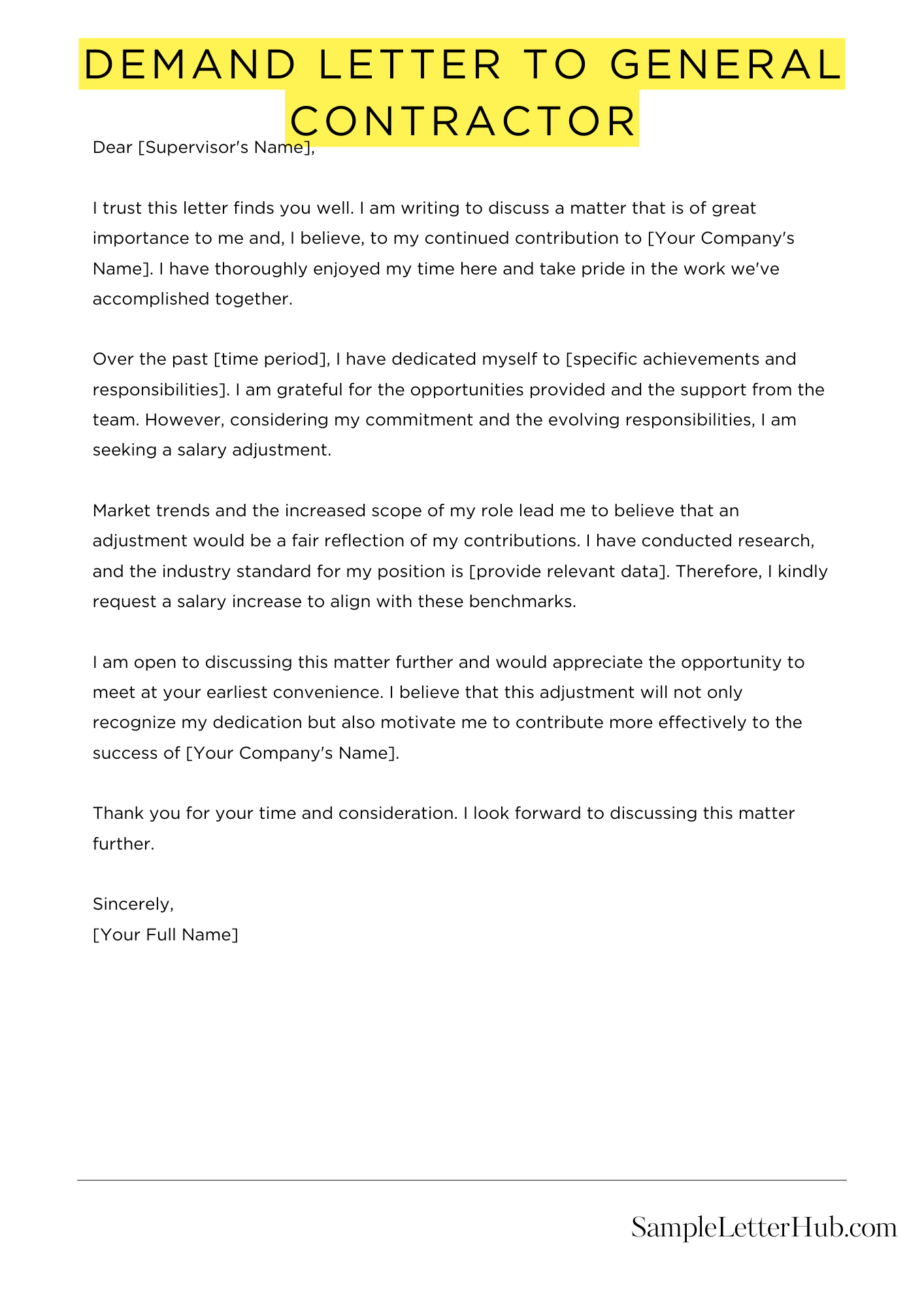A demand letter to a general contractor is a formal letter that outlines a claim or dispute and demands a specific action or resolution. It is typically used when a homeowner or business owner believes that the general contractor has breached their contract or failed to fulfill their obligations.
In this blog article, we will provide you with templates, examples, and samples of demand letters to general contractors. These templates and examples will help you draft a clear and concise demand letter that outlines your claim and demands the appropriate action or resolution.
By providing these templates and examples, we aim to make it easier for you to write a demand letter to a general contractor and protect your rights in the event of a dispute or breach of contract.
Demand Letter To General Contractor
Dear [General Contractor’s Name],
I am writing to demand payment for the work I completed on the [project name] project. As per our contract, I was to be paid [amount] for my services. I completed the work on [date] and have not yet received payment.
I have attempted to contact you several times to resolve this issue, but I have not received a response. I am now requesting that you pay the full amount owed to me within 14 days of receipt of this letter.
If you do not pay the full amount owed within 14 days, I will have no choice but to pursue legal action to recover the money that is owed to me. I would prefer to resolve this matter amicably, but I will not hesitate to take legal action if necessary.
Thank you for your attention to this matter.
Sincerely,
[Your Name]

How to Write a Demand Letter to a General Contractor
A demand letter is a formal written communication that outlines a legal claim and demands specific action from the recipient. It is often used as a last resort before filing a lawsuit. If you have a dispute with a general contractor, writing a demand letter can be an effective way to resolve the issue without going to court.
1. Gather Your Evidence
Before you write a demand letter, you need to gather all of the evidence that supports your claim. This may include contracts, invoices, emails, text messages, and photographs.
2. State Your Claim Clearly
The first paragraph of your demand letter should clearly state your claim. Be specific about the breach of contract or other legal violation that you are alleging.
3. Demand Specific Action
The second paragraph of your demand letter should state the specific action that you are demanding from the general contractor. This could include payment for damages, repairs to defective work, or a refund of your deposit.
4. Set a Deadline
The third paragraph of your demand letter should set a deadline for the general contractor to respond to your demand. This deadline should be reasonable, but it should also give the general contractor enough time to investigate your claim and take action.
5. Warn of Legal Action
The fourth paragraph of your demand letter should warn the general contractor that you will take legal action if they do not comply with your demand. This is not a threat, but it is a reminder that you are serious about your claim.
6. Keep it Professional
Your demand letter should be professional and respectful, even if you are angry or frustrated. Avoid using inflammatory language or making personal attacks.
7. Get Legal Help if Needed
If you are not comfortable writing a demand letter on your own, you can get help from an attorney. An attorney can help you to draft a demand letter that is legally sound and persuasive.
FAQs about Demand Letter To General Contractor
What is a demand letter to a general contractor?
A demand letter to a general contractor is a formal letter that outlines a claim for payment or performance against the contractor. It typically includes details of the contract, the alleged breach, and the amount of damages being claimed.
When should I send a demand letter to a general contractor?
A demand letter should be sent to a general contractor when all other attempts to resolve the issue have failed. This may include attempts to communicate with the contractor directly, or through a mediator or attorney.
What should I include in a demand letter to a general contractor?
A demand letter to a general contractor should include the following information:
- A clear statement of the claim, including the specific breach of contract or other legal duty that has occurred.
- A detailed description of the damages that have been incurred as a result of the breach.
- A demand for payment or performance, including the amount of damages being claimed and the deadline for payment or performance.
- A statement of the legal basis for the claim, including any relevant statutes or case law.
- A warning that legal action will be taken if the claim is not resolved.
What are the benefits of sending a demand letter to a general contractor?
Sending a demand letter to a general contractor can have several benefits, including:
- It can help to resolve the issue without the need for further legal action.
- It can put the contractor on notice of the claim and preserve your legal rights.
- It can help to strengthen your position in any subsequent legal proceedings.
What are the risks of sending a demand letter to a general contractor?
There are some potential risks associated with sending a demand letter to a general contractor, including:
- The contractor may become defensive and less likely to cooperate.
- The contractor may file a counterclaim against you.
- The demand letter could damage the relationship between you and the contractor.

